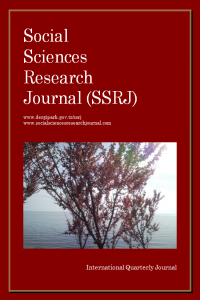TÜRKİYE'DE KALKINMA VE ÇEVRE KALİTE BAĞLANTISI: AMPİRİK BİR ÇALIŞMA
Kalkınma, Finansal Gelişme, Ekonomik Büyüme, Çevre Kalitesi, VECM Modeli
___
- Abbasi, F., & Riaz, K. (2016). CO2 emissions and financial development in an emerging economy: An augmented VAR approach. Energy Policy, 90, 102–114. https://doi.org/10.1016/j.enpol.2015.12.017
- Akbostanci, E., Türüt-Aşik, S., & Tunç, G. I. (2009). The relationship between income and environment in Turkey: Is there an environmental Kuznets curve? Energy Policy, 37(3), 861–867. https://doi.org/10.1016/j.enpol.2008.09.088
- Akin, C. S. (2014). The Impact of Foreign Trade, Energy Consumption and Income on Co 2 Emissions. International Journal of Energy Economics and Policy, 4(3), 465–475. Retrieved from www.econjournals.com
- Begum, R. A., Sohag, K., Abdullah, S. M. S., & Jaafar, M. (2015). CO2 emissions, energy consumption, economic and population growth in Malaysia. Renewable and Sustainable Energy Reviews. https://doi.org/10.1016/j.rser.2014.07.205
- De Bruyn, S. M., Van Den Bergh, J. C. J. M., & Opschoor, J. B. (1998). Economic growth and emissions: Reconsidering the empirical basis of environmental Kuznets curves. Ecological Economics, 25(2), 161–175. https://doi.org/10.1016/S0921-8009(97)00178-X
- Eddine Chebbi, H., Olarreaga, M., & Zitouna, H. (2011). Trade Openness and Co 2 Emissions in Tunisia . Middle East Development Journal, 3(1), 29–53. https://doi.org/10.1142/s1793812011000314
- Grossman, G. M., & Krueger, A. B. (1991). Environmental Impacts of a North American Free Trade Agreement. National Bureau of Economic Research Working Paper Series, No. 3914(3914), 1–57. https://doi.org/10.3386/w3914
- Halicioglu, F. (2009). An econometric study of CO2 emissions, energy consumption, income and foreign trade in Turkey. Energy Policy, 37(3), 1156–1164. https://doi.org/10.1016/j.enpol.2008.11.012
- Johansen, S., & Juselius, K. (1990). Maximum likelihood estimation and inference on cointegration with application to the demand for money. Oxford Bulletin of Economics and Statistics, 52, 169-210.
- Lindmark, M. (2002). An EKC-pattern in historical perspective: Carbon dioxide emissions, technology, fuel prices and growth in sweden 1870-1997. Ecological Economics, 42(1–2), 333–347. https://doi.org/10.1016/S0921-8009(02)00108-8
- Mikayilov, J. I., Galeotti, M., & Hasanov, F. J. (2018a). The impact of economic growth on CO2 emissions in Azerbaijan. Journal of Cleaner Production, 197, 1558–1572. https://doi.org/10.1016/j.jclepro.2018.06.269
- Mikayilov, J. I., Galeotti, M., & Hasanov, F. J. (2018b). The impact of economic growth on CO2 emissions in Azerbaijan. Journal of Cleaner Production. https://doi.org/10.1016/j.jclepro.2018.06.269
- Niu, S., Ding, Y., Niu, Y., Li, Y., & Luo, G. (2011). Economic growth, energy conservation and emissions reduction: A comparative analysis based on panel data for 8 Asian-Pacific countries. Energy Policy, 39(4), 2121–2131. https://doi.org/10.1016/j.enpol.2011.02.003
- Ozturk, I., & Acaravci, A. (2010). CO2 emissions, energy consumption and economic growth in Turkey. Renewable and Sustainable Energy Reviews, Vol. 14. https://doi.org/10.1016/j.rser.2010.07.005
- Saud, S., Chen, S., Danish, & Haseeb, A. (2019). Impact of financial development and economic growth on environmental quality: an empirical analysis from Belt and Road Initiative (BRI) countries. Environmental Science and Pollution Research, 26(3), 2253–2269. https://doi.org/10.1007/s11356-018-3688-1
- Say, N. P., & Yücel, M. (2006). Energy consumption and CO2 emissions in Turkey: Empirical analysis and future projection based on an economic growth. Energy Policy, 34(18), 3870–3876. https://doi.org/10.1016/j.enpol.2005.08.024
- Shahbaz, M., Ozturk, I., Afza, T., & Ali, A. (2013). Revisiting the environmental Kuznets curve in a global economy. Renewable and Sustainable Energy Reviews, Vol. 25, pp. 494–502. https://doi.org/10.1016/j.rser.2013.05.021
- Shahbaz, M., Solarin, S. A., Mahmood, H., & Arouri, M. (2013). Does financial development reduce CO2 emissions in Malaysian economy? A time series analysis. Economic Modelling, 35, 145–152. https://doi.org/10.1016/j.econmod.2013.06.037
- Sharma, S. S. (2011). Determinants of carbon dioxide emissions: Empirical evidence from 69 countries. Applied Energy, 88(1), 376–382. https://doi.org/10.1016/j.apenergy.2010.07.022
- Tamazian, A., Chousa, J. P., & Vadlamannati, K. C. (2009). Does higher economic and financial development lead to environmental degradation: Evidence from BRIC countries. Energy Policy, 37(1), 246–253. https://doi.org/10.1016/j.enpol.2008.08.025
- Tiwari, A. K. (2011). A structural VAR analysis of renewable energy consumption, real GDP and CO2 emissions: Evidence from India. In Economics Bulletin (Vol. 31). Retrieved from https://www.researchgate.net/publication/220008628
- Wang, S., Li, Q., Fang, C., & Zhou, C. (2016). The relationship between economic growth, energy consumption, and CO2 emissions: Empirical evidence from China. Science of the Total Environment, 542, 360–371.
- Yayın Aralığı: Yılda 4 Sayı
- Yayıncı: Denta Florya ADSM Limited Company
Ünal Halit ÖZDEN, Kubilay ERİŞLİK
Covid-19 Krizinde Karar Verme: Bir Vaka Analizi
Televizyon Reklamlarında Yaşlı Temsillerinin Yaşlılık Algısına Etkisi
Stres ve Örgütsel Bağlılık İlişkisi: Gemiadamları Üzerine Bir Araştırma
Gazâlî ve Augustinus Açısından Mânevî Olgunlaşma Merhaleleri
LİSE ÖĞRENCİLERİNİN ÜST BİLİŞSEL FARKINDALIKLARININ VE KARAR VERME BECERİLERİNİN İNCELENMESİ
Güçlendirme Yaklaşımı Çerçevesinde Engelli Kadınlar İçin Sosyal İçermede Olumlu Stratejiler
Risk Odaklı İç Denetim: Kuyumculuk Sektöründe Bir Vaka Çalışması
